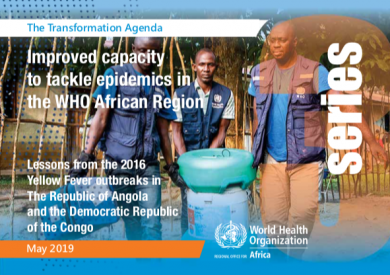
The Transformation Agenda Series 3: Improved Capacity to Tackle Epidemics in the WHO African Region – Lessons from the 2016 Yellow Fever in the Republic of Angola and the Democratic Republic of the Congo
Dear Reader and Stakeholder,
“The Transformation Agenda of the World Health Organization Secretariat in the African Region, 2015–2020”, hereinafter referred to as the Transformation Agenda, was initiatedas a bold and ambitious agenda to engender a regional health organization that isforesighted, proactive, responsive, results-driven, transparent, accountable, appropriatelyresourced and equipped to deliver on its mandate. This means an organization that meets the needs and expectations of its stakeholders – “the WHO that the staff and stakeholders want” – including being responsive and effective in strengthening national health systems;coordinating disease prevention and control activities, as well as outbreak preparedness and response; and launching supranational actions in support of global health security.
The first year of implementation of the Transformation Agenda, 2015, coincided with the planning processes for the preparation of the WHO Programme Budget 2016–2017. It also saw the adoption of the 17 Sustainable Development Goals (SDGs) and 169 targetsto guide global development over the next 15 years to 2030, with Goal 3 aiming to“ensure healthy lives and promote well-being for all at all ages”. These afforded the WHO Secretariat in the African Region the opportunity to institutionalize the TransformationAgenda by developing The Africa Health Transformation Programme, 2015–2020: a Vision for Universal Health Coverage which serves as the strategic framework for guidingWHO’s contribution to the sustainable development platform in Africa. Its goal is toensure universal access to a package of essential health services in all Member Statesof the Region and thus achieve universal health coverage (UHC) with minimal financial,geographic and social obstacles.


